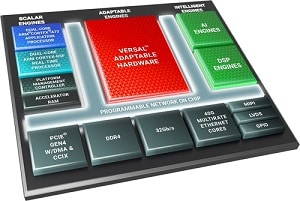The new AI Edge ACAP series delivers AI-enabled intelligence for automotive, robotics, healthcare and aerospace applications

The Versal AI Edge series by Xilinx enables AI innovation from the edge to the endpoint. With 4X the AI performance-per-watt versus GPUs and 10X greater compute density versus previous-generation adaptive SoCs, the Versal AI Edge series offers a scalable and adaptable portfolio for next-generation distributed intelligent systems. Versal AI Edge adaptive compute acceleration platforms (ACAPs) deliver intelligence to a wide range of applications including: automated driving, robotics, predictive factory and healthcare systems, and multi-mission payloads for the aerospace and defence markets.
The series features AI Engine-ML to deliver 4X machine learning compute compared to the previous AI Engine architecture and integrates new accelerator RAM with an enhanced memory hierarchy for evolving AI algorithms. These architectural innovations deliver up to 4X AI performance-per-watt versus GPUs and lower latency resulting in far more capable devices at the edge.
AI-enabled automated systems require high compute density that can accelerate whole applications from sensor to AI to real-time control. Versal AI Edge devices achieve this by delivering 10X compute density versus Zynq UltraScale+ MPSoCs, enabling more intelligent autonomous systems. Additionally, Versal AI Edge devices support multiple safety standards across industrial (IEC 61508), avionics (DO-254/178), and automotive (ISO 26262) markets, where vendors can meet ASIL C random hardware integrity and ASIL D systematic integrity levels.
The Versal AI Edge series takes the Versal architecture and miniaturises it for AI compute at low latency, all with power efficiency as low as six watts and safety and security measures required in edge applications. As a heterogeneous platform with diverse processors, the Versal AI Edge series matches the engine to the algorithm, with Scalar Engines for embedded compute, Adaptable Engines for sensor fusion and hardware adaptability, and Intelligent Engines for AI inference that scales up to 479 (INT4) TOPS2—unmatched by ASSPs and GPUs targeting edge applications—and for advanced signal processing workloads for vision, radar, LiDAR, and software-defined radio.
Connectivity blocks range from LPDDR-4266, 32Gb/s transceivers to meet all the necessary protocols in edge applications, 40G multirate Ethernet, PCIe Gen4 with CCIX and native MIPI support for vision sensors up to eight-megapixel resolution and beyond—critical to Level-2 ADAS and above. With more powerful AI Engines and an enhanced memory hierarchy that includes accelerator RAM, the Versal AI Edge series is ideal for a wider range of applications across numerous markets.
Accessible to both hardware and software developers, Versal AI Edge ACAPs provide a design-entry point for any developer, including Vivado design tools for hardware developers, the Vitis unified software platform for software developers, Vitis AI for data scientists, and domain-specific operating systems, frameworks and acceleration libraries for the platform’s target applications.
The Versal AI Edge series has adaptive SoCs that are fully software-programmable, with performance and flexibility that far exceed that of conventional CPUs, GPUs, and FPGAs. ACAPs can be changed at both the hardware and software level to dynamically adapt to the needs of a wide range of applications and workloads from edge to cloud.






